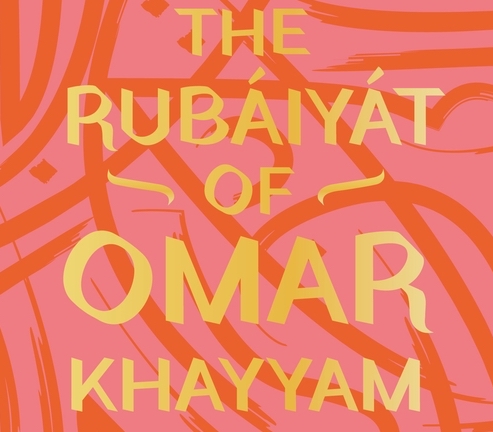British man of letters Edward FitzGerald translated the Rubáiyát of Omar Khayyám from two Persian manuscripts and published it in 1859. He had substantial help from young Orientalist Edward Cowell, who discovered a manuscript of the Rubáiyát dated 1460 CE in the Bodleian Library at Oxford. Rubáiyát means “quatrains,” and in Persian poetry they consist of four lines with an aaba rhyme scheme (older ones had aaaa, but that was considered too difficult to achieve).
In FitzGerald’s first edition (there were three subsequent ones, with additions and changes), the first quatrain goes this way:
I.
AWAKE! for Morning in the Bowl of Night
Has flung the Stone that puts the Stars to Flight
And Lo! the Hunter of the East has caught
The Sultan’s Turret in a Noose of Light
This Persian original is identified by A. J. Arberry as Calcutta 137. From how Arberry describes it, I believe this is the original:
خورشيد كمند صبح بر بام افكند
كيخسرو روز باده در جام افكند
مي خور كه منادي سحرگه خيزان
آوازه اشربو در ايام افكند
I present below a fairly literal translation of the Persian, which I’m able to do in part because I have a better text than FitzGerald did. Since I’m trying to stay close to the original, unlike FitzGerald (whose poetry is genius), I am not trying to replicate the Persian aaba rhyme scheme, satisfying myself with abca instead. I do put it in iambic pentameter, the meter FitzGerald used:
When sunrise lassoes roof tops with its rays,
and morning wine fills Khosrow’s royal cup —
then sip a fine Shiraz – dawn’s herald has
proclaimed the call “Drink up!” throughout the days.
Transliteration:
Khorshīd kamand-e sobh bar bām afkand
Kaykhosrow-e rūz bāde dar jām afkand
May khor ke monādī-ye sahar-gah khīzān
āvāzah-‘e “ishrabū!” dar ayyām afkand
FitzGerald’s “hunter of the east” is Kay-Khosrow, the Sasanian Emperor Khosrow II (d. 628), who conquered much of the known world from Central Asia to Egypt and fatally weakened the Eastern Roman Empire.
Ancient Zoroastrians, the pre-Islamic religion of Iran, had a custom of drinking a cup of wine on rising at dawn, and it worked its way into even Islamic poetry. Arab warriors also drank wine when they rose, according to the ancient poetry of the Mu`allaqat, to gain some liquid courage for the battle to come. But I think this wine-drinking at dawn is of the Iranian sort, more genteel and urbane.
The image of the dawn having a crier or munadi that commands ishrabu, “drink up” in Arabic, is a piece of irreverence, since in Muslim societies at dawn the caller to prayer or muezzin melodiously instructs people to rise and pray.
Sufis interpreted wine, however, as a symbol for union with God, and so from that point of view the muezzin’s call to prayer is a summons to an inebriating spiritual communion with divine, hence “wine.”
Personally, I think in the corpus of Persian poetry attributed to Omar Khayyam, the wine is just wine and a kind of medieval Muslim secularism is being celebrated.
This poem is not in my own translation of the Rubáiyát of Omar Khayyám, since I stuck to the early 1460 manuscript in the Bodleian and I consider the Calcutta manuscript to be late and full of Mughal-era Indian verse (not that there is anything wrong with that).

Order Juan’s new translation of the Rubaiyat from
or Barnes and Noble, who will ship it to you.
or for $16 (right now) at Amazon Kindle
In this series:
FitzGerald’s Rubáiyát of Omar Khayyám 1:1
“Awake my little ones and fill the Cup!” FitzGerald’s Rubáiyát of Omar Khayyám 1:2
“Those who Stood before the Tavern” – FitzGerald’s Rubáiyát of Omar Khayyám 1:3
Now the New Year is Reviving old Desires: FitzGerald’s Rubáiyát of Omar Khayyám 1:4
“But still the Vine her ancient Ruby Yields:” Fitzgerald’s Rubáiyát of Omar Khayyám 1:5
“Red Wine!” – the Nightingale cries to the Rose: FitzGerald’s Rubáiyát of Omar Khayyám 1:6


 © 2026 All Rights Reserved
© 2026 All Rights Reserved